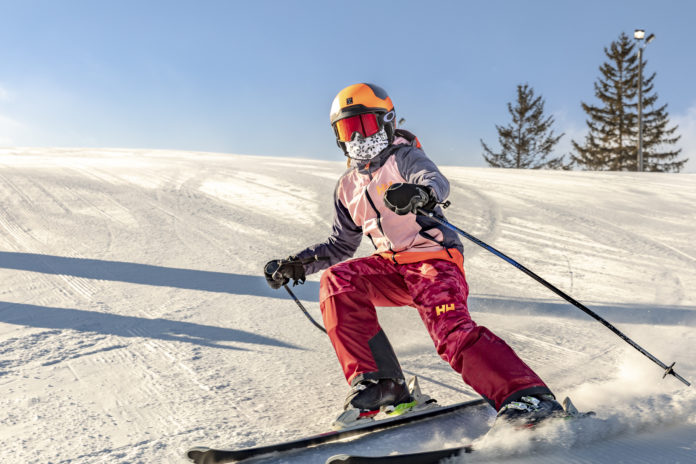From the Baraboo Hills to Michigan’s Upper Peninsula and beyond, things will be different at regional ski resorts this winter as they adjust to the ongoing coronavirus pandemic.
That will mean fewer people allowed in lodges and on the slopes during peak periods, reduced lesson offerings, limitations on chairlift capacities and mask requirements in lift lines, among others.
The changes also mean resorts will take a financial hit, though no figures are available at this point.
In an effort to even out visits, resorts are encouraging guests to ski, snowboard and go tubing during midweek when possible because numbers are usually much lower than busy weekends.
“We’re making lots of alterations to keep our customers and employees safe,” said Joe Vittengl, who has worked at Devil’s Head near Baraboo for more than three decades and is now the four-season resort’s general manager.
He said he has watched numerous webinars from the National Ski Areas Association featuring ‘best practices’ recommendations on how resorts should operate.
“In some ways, skiing and snowboarding will be ‘old school’ this season,” he said. “We are encouraging people to put on their gear in the parking lot, stay outside on the slopes as much as possible and eat lunch in their cars rather than come inside.
“We want people to be outside in the fresh air because it’s safer out there. We don’t want people to use the lodge as a basecamp, like many have in the past. To make up some of the difference, we’re adding outdoor seating.”
He said Devil’s Head is changing its rental system to a computerized program so that guests will be appropriately spaced when they pick up their gear and “won’t all be jammed in the same area at the same time.”
Likewise, he said skiers and snowboarders are being encouraged to buy their tickets online.
Vittengl said the resort, which offers golf in the summer and fall, has had months to learn how to operate during the pandemic. He said it canceled 50 weddings during the summer. But its hotel and restaurants remained open, though operating at reduced levels.
“We’ve added signage, reduced touch points, are encouraging people to stay six feet apart and will be running our cafeteria as more of a grab-and-go operation,” said Vittengl, who encouraged guests to consult the resort’s website for regulations.
“We want to follow the right protocols, but we still want this to be fun for the folks who are coming up to have a good time on the snow,” he said.
Jamison Vaughn, director of operations at Cascade Mountain Resort near Portage, said his resort is taking a conservative approach.
“Masks will be required inside, in lift lines and on chairlifts, which will be at 50 percent capacity unless you are with family members or someone you came with. There will also be significant capacity reductions in the lodge.”
In addition, only private lessons will be offered at Cascade for groups of five or less who book together. And no group discounted tickets will be offered this season, he said.
He said the resort has built an outdoor deck that will be heated and covered. In addition, several fire pits have been added to encourage skiers and snowboarders to take breaks outdoors rather than in the lodge.
“This will be the year of the informed consumer,” he said. “We hope everyone looks at our website before they come up and are prepared to deal with any new policies.”
Stewart Stoffregen, a spokesman for Chestnut Mountain in the bluffs above the Mississippi River near Galena, Ill said his resort will limit the number of tickets it sells
on weekends and holidays.
“On a busy Saturday, we might get 2,500 to 3,000 skiers and snowboarders,” he said. “Right now, our plans are to keep that to about 1,500 and they will all be online tickets. We hope to open that up some if we can, but we are still trying to figure things out.”
Jim Wick, marketing director at Lutsen Mountains on the shore of Lake Superior in Minnesota, said his resort is putting a limit on peak days and making other changes, including reducing inside capacity by 50 percent at its lodges.
Ski school lessons will only be available online, he said.
“To avoid congestion points inside, classes will meet outside,” he said. “We’ll still offer some children’s programs, but they won’t be all-day with a lunch in the middle.
“We’ll also have an online calendar that is yellow, orange and red. Yellow will be peak days, so you’ll need to buy early. They’ll turn orange as tickets are going fast and then red when we’re sold out. Because of our distance from a lot of cities, people are used to making advanced plans.”
Lutsen has on-mountain lodging for 1,000, so he said he hopes many people who stay at the resort will return to their rooms for lunch and breaks.
Vick said 65 percent of ticket sales have been done online in recent years, but he hopes that number will increase to more than 90 percent this year.
Because many people may be reluctant to get on airplanes to reach ski resorts in the West (Utah’s Park City anticipates its visitors will drop 40 percent this winter), he said Lutsen could see more guests.
“Lutsen is spread out over more than 1,000 acres, with a vertical drop of 825 feet,” he said. “If people don’t want to go West this winter, we offer an experience that is more like the West than any other resort in this region.”
In southeastern Wisconsin, smack-dab on the Illinois border, the Wilmot Mountain Resort is requiring all guests to make reservations online at EpicPass.com. No walk-up sales will be permitted this season.
Ski and snowboard class sizes have been reduced to a maximum class size of six at Wilmot. For 5- and 6-year-olds, the maximum class size will be four. And because 3- and 4-year-olds often spend a good portion of their lesson indoors, only private, one-hour lessons will be offered for this age group.
In addition, all participants must complete a pre-arrival self-health screening on the day of their lesson. And for all lessons, participants will meet on snow, not indoors.
Dining options are also being limited, which means the popular Walt’s Tavern will not operate as a full-service restaurant this year, but will be open on weekends as an indoor shelter. Guests are being “strongly advised” to bring their own snacks and water
In addition, face masks will be required and skiers and snowboarders may only ride lifts with members of their own party to ensure the resort’s social-distancing guidelines are being met.
At Tyrol Basin, located about 20 miles west of Madison, the resort has posted this motto on its website to encourage people who aren’t feeling well to stay home: “Don’t be the reason we lose the season!”
Tyrol is also requiring visitors to wear face coverings indoors and on lifts. It has added outdoor seating for diners as well, and is requiring snowboarders, skiers and snow tubers to make advanced ticket and rental reservations and payments.
-By Brian E. Clark
WisBusiness.com






